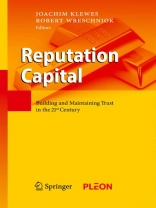• … release reputation bearers from the burden of being constantly mo- tored and reduce the likelihood of government or public supervision and control. • … strengthen client trust, ease the recruitment and retention of capable employees and improve access to capital markets or attract investors. • … legitimate positions of power and build up reserves of trust which – lowed companies and politicians – but also researchers and journalists – to put their issues on the public agenda, present them credibly and mould them in their own interests. But a fear of loss is not the only reason for the steadily increasing – portance of reputation in corporate management today (or more especially, in the minds of top management). Rather, the main reason is that corporate reputation has shifted from being an unquantifiable ‘soft’ factor to a me- urable indicator in the sense of management control. And it is a variable that is obviously relevant to a company’s performance: recent studies by the European Centre for Reputation Studies and the Ludwig-Maximilians- Universität of Munich compared the stock market performance of a port- lio of the top 25% of reputation leaders (based on regular reputation me- urements in the wider public) with that of the German DAX 30 stock m- ket index. The results show that a portfolio consisting of reputation leaders 1 outperformed the stock market index by up to 45% – and with less risk. Fig. 1. Performance of ‘reputation portfolios’ vs.
Mục lục
Reputation capital Building and maintaining trust in the 21st century.- I: Reputation in the 21st century – Good or evil?.- Trust and reputation in the age of globalisation.- Reputation or: How I learned to stop worrying and love the market.- II: The business case for reputation.- Recognition or rejection #x2013; How a company#x2019;s reputation influences stakeholder behaviour.- What#x2019;s measurable gets done #x2013; Communication controlling as a prerequisite for a successful reputation management.- The role of corporate and personal reputations in the global war for talent.- The CSR myth: true beauty comes from within.- The Brussels reputation story #x2013; the interplay of public affairs and reputation.- III: The 21st century of reputation crisis.- Managing reputational risk #x2013; A cindynic approach.- Managing reputational risk #x2013; Case studies.- Managing reputational risk #x2013; From theory to practice.- Reputation and regulation.- Measuring risks to reputation.- Crisismanagement in the media society #x2013; Communicative integrity as the key to safeguarding reputation in a crisis.- Getting the stain out of #x201C;sustainable brands#x201D;.- #x201C;Our reputation is at stake#x201D; #x2013; Corporate communications in the light of the global economic downturn.- IV: New perspectives for reputation management.- Community reputation communicates change to the world.- EU accession: Turkey#x2019;s reputation on its journey towards EU membership.- Consistency: a proven reputation strategy. How companies can optimise their message.- The Agora of the 21st century: On the invention of many-to-one communication.- The leader#x2019;s role in managing reputation.- Coca-Cola Hellenic reputation case study.- Never underestimate the importance of details.- Is there no prescription? Reputation in the pharmaceutical industry.- V: Reputation strategies for the 21st century.- Who wants to be a millionaire? Investment strategies for reputation management in the 21st century.
Giới thiệu về tác giả
Joachim Klewes is Senior Partner of Pleon and an associate professor at the Heinrich Heine University Duesseldorf. His over 25 years of expertise include major assignments in the fields of organisational consulting, corporate change and crisis management, as well as corporate communications. He is a founding partner of the opinion research institute com.X and a frequent writer, publisher and speaker.
Robert Wreschniok is a Senior Consultant at Pleon and is responsible for Reputation Management and Stakeholder Dialogue. After completing his M.A. in International Relations he received a certification for Strategic Foundation Management from the University of Basel. He is a board member of the European Centre for Reputation Studies and Spokesman of the Private Institute of Foundation Law.
Pleon is Europe’s leading communications consultancy, creating and implementing strategies for private and public sector organisations around the world. The agency has 33 branded offices with more than 1, 000 employees in 16 European countries and associate agencies in ten countries across Europe, the Middle East and Africa. Pleon was recently named ‘European Consultancy of the Year’ by the Holmes Report
Joachim Klewes is Senior Partner of Pleon and an associate professor at the Heinrich Heine University Duesseldorf. His over 25 years of expertise include major assignments in the fields of organisational consulting, corporate change and crisis management, as well as corporate communications. He is a founding partner of the opinion research institute com.X and a frequent writer, publisher and speaker.
Ralf Langen is Managing Partner of Pleon Germany and European Head of Pleon’s Change & Transformation Practice. He has been a communications management professional for more than 15 years both on the industry side and as a consultant. He specialises in change management, and crisis and issues management. He is also the founder and chairman of the European Centre for Reputation Studies (ECRS).
Pleon is Europe’s leading communications consultancy, creating and implementing strategies for private and public sector organisations around the world. The agency has 33 branded offices with more than 1, 000 employees in 16 European countries and associate agencies in ten countries across Europe, the Middle East and Africa. Pleon was recently named ‘European Consultancy of the Year’ by the Holmes Report and ‘Best Public Relations Agency’ in The 2008 International Business Awards.












